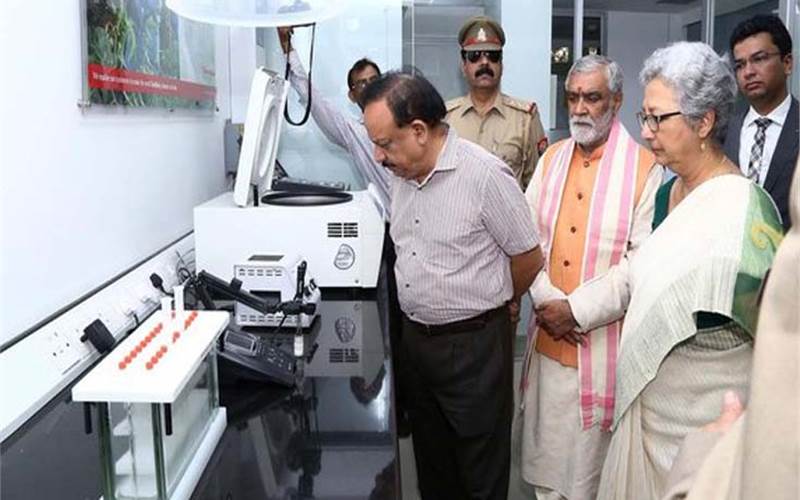FSSAI opens National Food Laboratory in Ghaziabad
FSSAI’s National Food Laboratory, at Ghaziabad, Delhi-NCR was inaugurated by Harsh Vardhan, Union minister of health and family welfare on 23 August 2019. The minister also laid the foundation stone of the FSSAI Tower. Incidentally, 23 August 2019 also marked the 13th anniversary of the Food Safety and Standards Act, 2006.
26 Aug 2019 | By Dibyajyoti Sarma
Ashwini Kumar Choubey, minister of state for health and family welfare also participated in the event, which was attended by over 300 partners and stakeholders from the scientific community, food businesses and corporates.
The National Food Laboratory, Delhi-NCR is one of the two premier referral laboratories under the direct administrative control of FSSAI.
This national laboratory is a result of a public-private-partnership, the first-of-its-kind in the food laboratory sector. It houses state-of-the-art collaborative training centres, namely, the Food Safety Solution Centre (FSSC) and the Centre for Microbiological Analysis Training (C-MAT).
The laboratory symbolises the synchronisation of policy-driven partnerships and collaboration with a holistic approach and a futuristic vision. The lab has a comprehensive array of equipment with the latest technologies and facilities to conduct analysis as per global accreditation standards for testing and calibration. FSSAI will also be establishing such laboratories at Mumbai and Chennai in the near future along the same lines.
In his inaugural address, Harsh Vardhan said, “For an effective regulatory food environment, a robust food testing ecosystem is important. This is essential to evaluate the quality and safety of food, their compliance to standards and also to identify any emerging risks from farm to fork.”
The FSSAI Tower, co-located at this place, has been planned to accommodate FSSAI’s growing staff numbers. The Central government has recently created 493 new posts for FSSAI, bringing the overall strength of FSSAI to 824. The new facility would also host visiting faculty and trainee officers during trainings and conferences. Other facilities include a cafeteria, day-care centre, fitness centre, conference hall and training centre. This eight-floor tower with adequate parking facilities shall further augment the capabilities of FSSAI and its National Food Laboratory.
Choubey, congratulating FSSAI in his keynote address, said, “This public-private-partnership in the food testing ecosystem will synergise the efficiency of the private sector and the regulatory control of the government in an efficient manner. I have full confidence in the success of this partnership and hope to see more such collaborations for other laboratories in the country. This advanced food-testing infrastructure will also help us fight any instances of food adulteration and will become more robust in the years to come.”
In the past few years, FSSAI has taken various steps to create and invest in an effective food-testing ecosystem in the country. With a robust system to recognise and notify laboratories in place, currently there is network of 261 food-testing laboratories, which has almost doubled from 138 in 2014. The Indian Food Laboratory Network (InFoLNet) has been created as a one-stop virtual-hub for transparent flow of laboratory information.
FSSAI has also launched ‘Food Safety on Wheels’ (FSW), a mobile food testing lab for testing, awareness and training. This first-of-its-kind, the innovative van will take food testing infrastructure to remote villages and far-flung areas, thus, instilling confidence among citizens. There are 44 FSWs currently, which are expected to cross 500 in the coming years.
FSSAI has been investing in strengthening state and referral labs with advanced equipment, microbiological testing facilities, apart from capacity building activities for all the laboratory personnel. Several of these referral laboratories have been recognised as National Reference Laboratories, 14 of which were awarded certificates of recognition at the event.
Pawan Agarwal, CEO, FSSAI, said, “This is a landmark occasion for FSSAI as today we have commemorated the 13th anniversary of FSS Act, 2006. Over the past seven-eight years, the authority has transformed the food safety ecosystem in the country with the support of our stakeholders. The National Food Laboratory, Delhi-NCR is one of the most advanced laboratories in the country and is at par with any other laboratory in advanced countries like USA. Today, India can proudly boast of one of the finest networks of laboratory systems and emerging as a hub of food testing ecosystem in Asia.” He added, “Initiatives like the Food Safety Magic Box enhance engagement and build scientific temper to unleash creative potential among students through simple and fun experiments around food. We plan to make these Magic Boxes available across Health and Wellness Centres and are hopeful for the support of the Health Ministry.”












 See All
See All